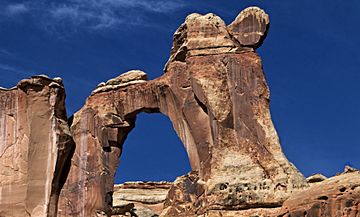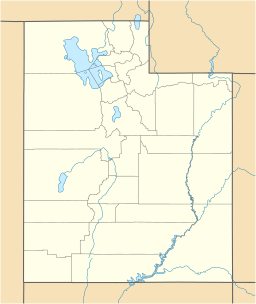Angel Arch facts for kids
Quick facts for kids Angel Arch |
|
|---|---|

East aspect in the morning light
|
|
| Highest point | |
| Elevation | 5,692 ft (1,735 m) |
| Geography | |
| Location | Canyonlands National Park San Juan County, Utah, U.S. |
| Topo map | USGS Druid Arch |
| Geology | |
| Age of rock | Permian |
| Type of rock | Cedar Mesa Sandstone |
| Climbing | |
| First ascent | 1993 |
Angel Arch is a giant natural rock arch found in Canyonlands National Park in Utah, USA. Many people think it's the most beautiful and amazing arch in the whole park. It looks like an angel with its wings folded, standing with its back to the arch opening. That's how it got its name!
You can find Angel Arch in a side canyon of Salt Creek Canyon. This area is part of the Needles District of the park. Water from the arch flows into Salt Creek, which eventually reaches the Colorado River.
Before it was officially named Angel Arch in 1963, people called it Pegasus Arch. The first time anyone climbed the arch was in June 1993. This climb was done by John Markel and Kevin Chase.
Contents
What is Angel Arch?
Angel Arch is the biggest natural arch in Canyonlands National Park. It's a huge opening in a rock formation. The top of the arch stands about 450 feet (137 meters) above the canyon floor. The opening itself is about 135 feet (41 meters) high and 120 feet (37 meters) wide. Imagine a building that tall!
How Angel Arch Formed
This amazing rock formation was created by nature over millions of years. It started as a tall, thin rock wall called a fin. This fin is made of a type of rock called Cedar Mesa Sandstone. This sandstone formed from ancient sand dunes that were deposited about 245 to 286 million years ago. This was during a time called the Permian period.
Over a very long time, wind, rain, and ice slowly wore away the softer parts of the sandstone. This process, called erosion, carved out the large opening we see today, creating the arch.
Visiting Angel Arch
To see Angel Arch, you can take a long hike. The round-trip hike to a viewpoint is about 29 miles (47 kilometers). If you want to get closer, there's an extra 0.75-mile (1.2-kilometer) trail that involves some climbing to reach the arch opening.
The best times to visit Angel Arch are in the spring and fall. During these seasons, the weather is usually mild and pleasant for hiking.
Climate in Canyonlands
The area around Angel Arch has a Cold semi-arid climate. This means it's a desert climate. It doesn't get much rain, usually less than 10 inches (254 millimeters) per year. Snowfall in winter is generally light. Even though it's a desert, the coldest month can have an average temperature below 32°F (0°C). Most of the rain and snow that does fall happens in spring and summer.
Images for kids
 | Emma Amos |
 | Edward Mitchell Bannister |
 | Larry D. Alexander |
 | Ernie Barnes |







